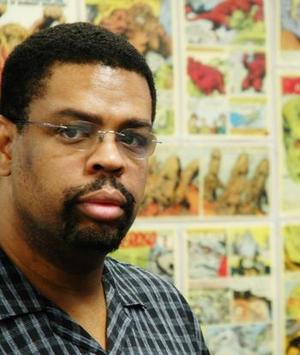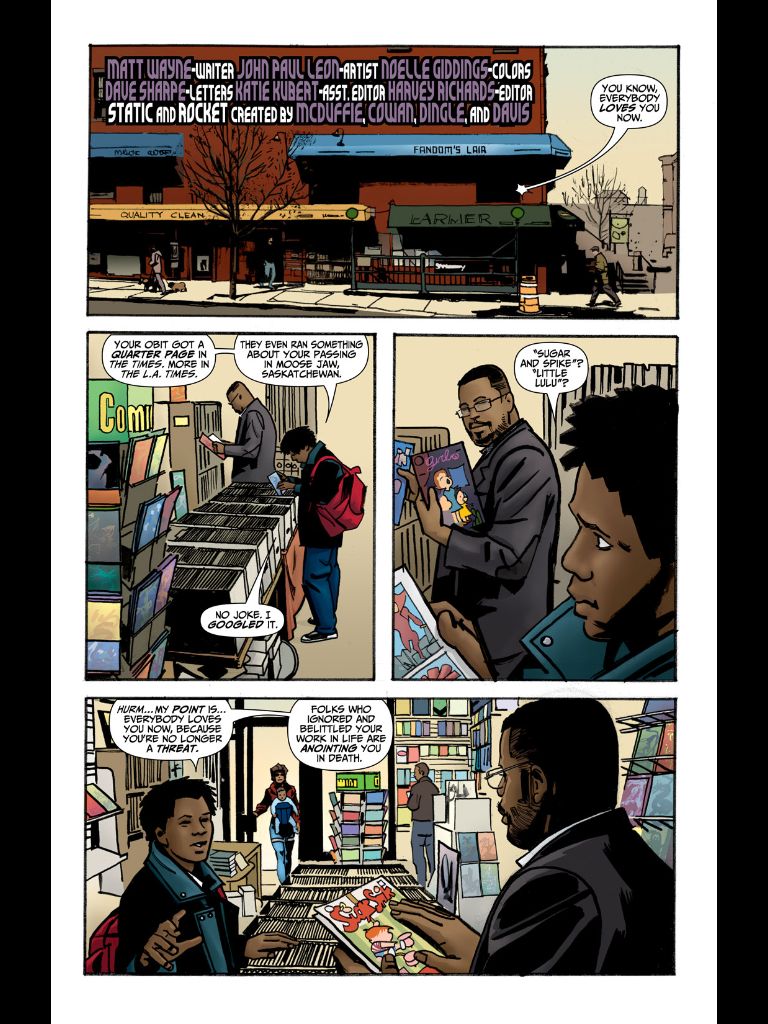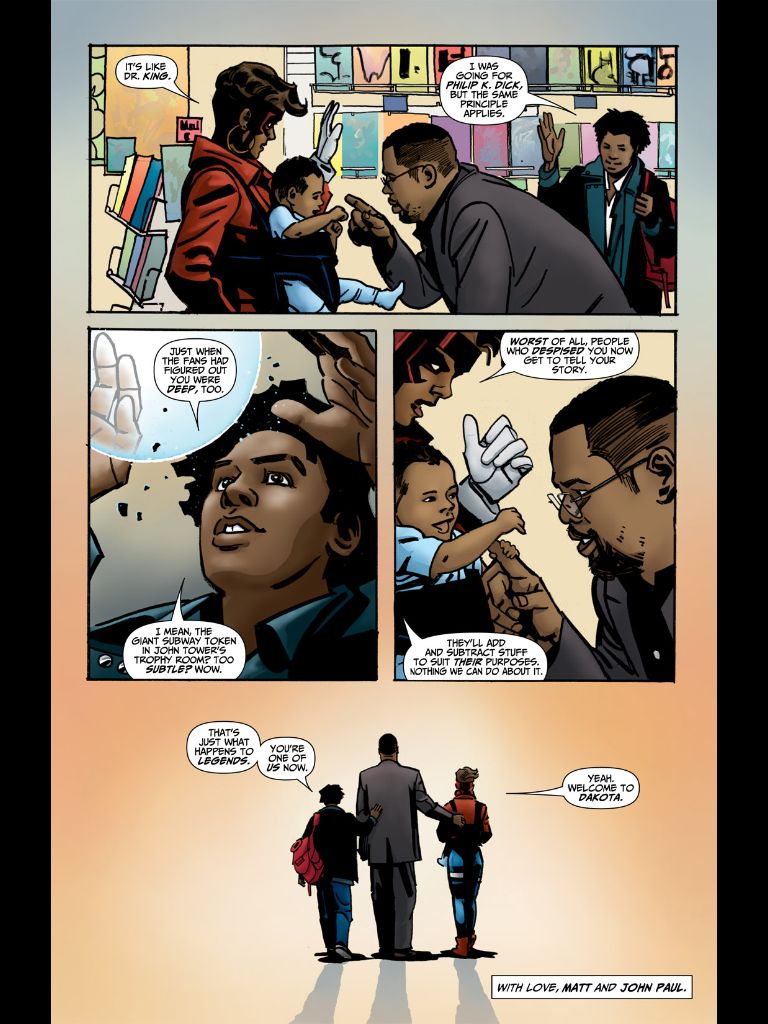I really can’t believe it. I’m flabbergasted at the amount of hate, nerdrage, and blatant racism I’ve seen in the last 24 hours over the casting of Michael B. Jordan in “The Fantastic Four.” This caps off a <sarcasm font>wonderful</sarcasm font> Black History Month that has included the acquittal of murderer Michael Dunn in Florida who shot a group of unarmed black teenagers, killing one, while murderer George Zimmerman plays the victim in the media saying he wishes he had his life back.
It’s times like these that make me wonder if we’re actually moving backwards (nee blackwards) in racism in our country. #ThanksObama
But rather than just curse the racism, I’d like to light a candle and spread some love. I can think of no better way to do that than to celebrate someone who has brought an inordinate amount of joy into my life and my childrens’ lives. And not only does he “happen to be black” (as though that is some sort of accident on the part of the universe? Like the normal setting is “White Male” and any time a person is something other than this it’s some sort of anomaly) but he is authentic and real in discussing race but also in just being universally good at his craft of writing for comics and television animation.
I do this because too often we think of “Black History Month” as being about Harriet Tubman and George Washington Carver. Maybe the more cultured think of Zora Neale Hurston, W.E.B. DuBois and Langston Hughes. Martin Luther King Jr, Malcolm X– maybe. But all of these people are historical figures, which makes it seem as though the fight for equality is a relic of a bygone era. This man is someone who has broken down barriers and made an impact in an industry (Entertainment) that is still almost 100% white-male dominated. But by his sheer talent, he could not be denied. Every geek today owes a great debt to this man– not someone from the distant past, but someone who has impacted our world today.

This is Dwayne McDuffie. If you’re a geek who enjoys animated shows, especially superhero shows from the DC side, you have lots to thank him for. You’ve probably also read some of his comics, or at least are familiar with the legacy he created. Even if you’re a Marvel guy, you can thank McDuffie for some of his work there, specifically in his creation of “Damage Control.”
On Feb 20, 2014, he would’ve been 52 years young. I say would’ve been, because today is the anniversary of his passing 3 years ago, Feb 21, 2011. And we really, really miss you, Dwayne McDuffie.
His passing left a void that simply cannot be filled. For those of you who have Netflix, go watch some random episodes of “Ben 10” and “Justice League”/”Justice League Unlimited.” The episodes where McDuffie serves as writer or story editor remain the best of the series. And where he is not involved, things often fall flat.
Many of us also grew up watching “Static Shock” (and some of us watched it in our 20s, ok? Ok.) — a series he created and wrote, and wrote the original comics source material for. And then, of course, there’s “Damage Control,” the comic about the team who has to come in and clean up after the big superhero fights. A titan of the comics and tv animation world, there is no replacing him.
While we often focus on Paul Dini or Bruce Timm and their exceptional contributions to DC Animation, I posit that Dwayne McDuffie’s contribution was equally as great and influential, from the writing side, as Timm’s/Dini’s was from the animation side. Timm himself mostly agreed, always talking up McDuffie’s scripts and his ability to pull through amazing plots.
Another thing fascinating about McDuffie was his grasp on science and physics. Originally a physics major in college, he would incorporate things into his scripts that other writers simply couldn’t dream of. From a ToonZone writeup of a McDuffie tribute panel at Wondercon 2011:
Timm remembered reading McDuffie’s first Justice League script and being “really really impressed by his command of dialogue and of pseudo-science…super-hero physics don’t really work like real physics, but he’d be able to explain these quasi-********, pseudo-science things in a way that made them sound convincing.” When it came to real science McDuffie “used to get really mad when he would do something that was scientifically accurate but didn’t seem scientifically accurate and the fans would ***** about it,” said Timm, citing a moment when the Flash was briefly ejected into outer space but survived. “Don’t ever argue that stuff with Dwayne!” he cautioned.
So perhaps one of the most important things about McDuffie is that most of the people enjoying his craft would never, ever know his face, his race, or anything of the sort. And yet, the touches are very clear, very subtle. And sometimes, when called for, more overt. It is achieving that balance, that authenticity, that made McDuffie the master craftsman.
McDuffie co-founded Milestone Media in the early 90’s with the express purpose of elevating black and other minority characters. Chief among these in terms of mainstream success is the aforementioned Static, and also the character Icon. From McDuffie’s own website about the purpose of Milestone:
“It’s something that’s been in the air for as long as I’ve been in the business,” says Milestone Media’s editor in chief Dwayne McDuffie. “Anytime you’d have a couple of black guys get together and stand around in the hall, they’d start talking about what they couldn’t do that they wanted to do.” The problem was trying to express an African American sensibility in a business run by whites, even well-meaning ones. That was the reason for the 1992 creation of Milestone, a comic book company owned by African-Americans. When Milestone’s comics were published the following year, they were printed and distributed through a special arrangement with DC Comics. “I’m passionately dedicated to Milestone,” says DC president Jenette Kahn. “The Milestone characters are so genuinely conceived and so well-executed that I really want to see them put on the map in as many ways as possible.”
The Milestone super hero characters were created by the company’s owners in a series of meetings held before DC was even approached. The Milestone principals include writer-editor Dwayne McDuffie, artist and creative director Denys Cowan and president Derek Dingle; a fourth partner, Michael Davis, quickly dropped out to run Motown Animation. Dingle had worked for business publications, including the Wall Street Journal, and had known Cowan when they were children; Cowan and McDuffie had become friends while working for Marvel Comics in the late 1980s. McDuffie credits Cowan for setting things in motion: “Denys had been saying for years that we just ought to get together and do it. And one day he called me, he called Derek Dingle, he called Michael Davis and he said ‘It’s time, let’s just do this.'” Eager to overcome the restrictions that they felt working on characters owned by Marvel, Cowan and McDuffie quickly realized that only a substantial number of new heroes could provide them with the freedom they wanted. “If you do a black character or a female character or an Asian character,” explains McDuffie, “then they aren’t just that character. They represent that race or that sex, and they can’t be interesting because everything they do has to represent an entire block of people. You know, Superman isn’t all white people and neither is Lex Luthor. We knew we had to present a range of characters within each ethnic group, which means that we couldn’t do just one book. We had to do a series of books and we had to present a view of the world that’s wider than the world we’ve seen before.”
I love that McDuffie was able to lovingly and artfully bring some of this to the comics universe without it ever feeling like tokenism or in any way false. These characters were black. Authentically so. And McDuffie’s artisanship simply made that not an issue for most people. He’s one of the reasons Jon Stewart is one of my favorite Green Lanterns, and it was really only after McDuffie took over writing duties that he became interesting and anything more than just another guy with a power ring to me.
One of the elements of white, male privilege is that we are rarely, if ever, made to feel uncomfortable or cognizant of our race, our gender. As a black man, everything Dwayne McDuffie did was put under a microscope by a subset of readers who never let him forget he was black, or that he was writing black characters. Just listen as McDuffie talks about writing for Justice League and comics in general:
I like how he talks about the “hyper-rational” tone of the veiled racism, the privilege on display. That’s exactly what we’re seeing in the past 24 hours with the nerdrage freakout over the Human Torch casting. It’s this that sickens me– the air of gentility and smarminess with which people display their bigotry.
But it’s not as though Dwayne McDuffie could only write black characters. Far from it. Even writing for an all-white cast like on Ben 10, McDuffie’s touches were palpable. Again, go to Netflix, take a random subset of episodes and watch them. The good ones all have McDuffie fingerprints. The less good ones do not. (Helps explain why the current Ben10 is, while very good, just missing. . .something.) He’s simply irreplaceable. White, black, Latino, Asian, man, woman, gay, straight — it didn’t matter. He had the goods. And his being black makes that no more or less remarkable, but it is simply part of who he is and what we should celebrate.
Regarding the animated film of “All-Star Superman”, which was released posthumously just days after his death, original comic writer Grant Morrison praised McDuffie’s adaptation of his work, claiming he was able to find plots and string them together that were far superior to his original 12-issue comic series. Yeah. We all knew Dwayne McDuffie > Grant Morrison. But it’s nice to hear him admit that.
Those of you who have the DVD of “All-Star Superman,” there is a touching tribute on there to McDuffie. And, again, since that point, the quality of DC Animation has suffered greatly. You lose McDuffie, you lose Timm, and that’s what’s going to happen to your animation shop. Irreplaceable.
I wish Dwayne McDuffie were still here. DC Animation would certainly be better for it. He’d likely be able to parse through all the bullshit out there about Michael B Jordan and say something insightful that could help deflate this situation. It’s sad that the only way my son will learn about him is me taking time to tell him how important Dwayne McDuffie, Paul Dini, and Bruce Timm were, and watch Static Shock and talk about race as an issue.
We really miss you, and hopefully remember you more often than just during Black History Month or the anniversary of your birth or death.
And I wish there were a “Damage Control” tv show or miniseries and you were around to write it.
UPDATE:
Charlotte Fullerton, herself an accomplished writer and story-editor in the world of animation — who also happens to be Dwayne McDuffie’s widow — tweeted the following cartoon, and I couldn’t help but include them here. I hope I’m not guilty of a lot of what is being mentioned here, but if this article has bordered on hagiography, it’s because that’s how I legitimately feel. I don’t apologize for that, nor do I back down from my main opinion. But I do acknowledge any flaws I may have that emanate from my own fandom, my imperfections as a writer, and blind spots.
Peace.

